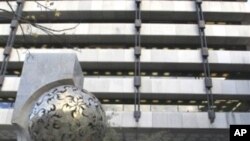The chief of Ireland's central bank says he thinks the country will receive tens of billions of dollars in loans from European partners and the International Monetary Fund. The funds would be used to help shore up Ireland's battered banks and stabilize the economy.
Central Bank of Ireland Governor Patrick Honohan spoke as officials from the European Union and the International Fund arrived in Dublin to assess the country's financial situation.
He said he expects negotiations will lead to a loan.
"It will be a large loan because the purpose of the amount to be advanced or to be made available to be borrowed is to show that Ireland has sufficient firepower to deal with any concerns of the market - that is the purpose of it. So we are talking about a very substantial loan for sure, tens of billions yes," he said.
Ireland is crippled in debt because the government had to bail out the country's main banks, at an estimated cost of more than $60 billion. That has driven Ireland's 2010 deficit to 32 percent of GDP.
Ireland's prime minister has repeatedly said his country will not need a bailout, which would put its economy under international supervision.
But the proposed multi-billion-dollar loan would bring a long-term solution to Ireland's problems, says researcher Harald Eggerstedt of RIA Capital Markets in Scotland.
"In order to share the burden with Ireland and avoid further damage to the European banks, yes the other countries should help them support them on the fiscal side to carry this burden," said Eggerstedt.
The European Union set up a fund to help member countries in need of financial support, after Greece went into financial meltdown earlier this year.
The debacle over Greece was drawn out and complicated. Eggerstedt says the response to Ireland seems to be better organized.
The crises in Greece and Ireland, he says, are strengthening the European Union by forcing it to get organized.
"The more experience we get with these mechanisms, the better for the European Union in the long term. It can signal to outside investors it can actually handle these issues," said Eggerstedt.
The final decision on whether Ireland will take up the bailout lies with the Irish government, which has yet to comment.
World stock markets rose Thursday in part as a response to the apparent moves towards an Irish financial rescue package.
Irish Republic Set for Bailout
